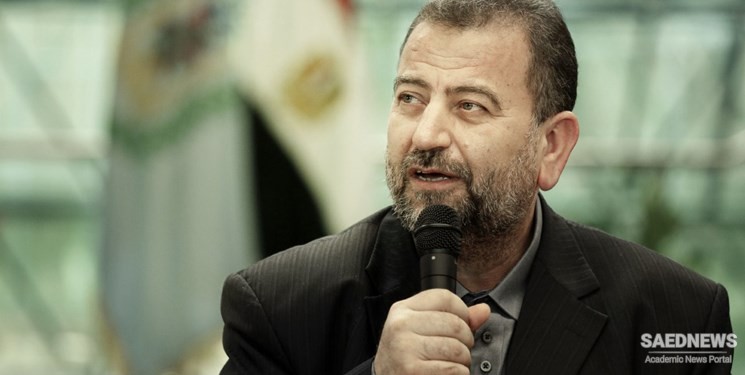SAEDNEWS: The assassination took place after Gazans and resistance groups staged "heroic steadfastness" in the face of a genocidal war that Israel has been waging against the besieged strip since the military operation in early October, Kana’ani said on Tuesday night.
The Zionist regime had resorted to the targeted killing after suffering "heavy and irreparable defeat" in the face of Palestinian resistance movements during Operation Al-Aqsa Storm, the spokesperson stated, adding by perpetrating such atrocity, Tel Aviv proved once again that it was "founded upon assassination and crime”.
An Israeli drone strike in the Lebanese capital of Beirut martyred Al-Arouri on Tuesday. Samir Findi Abu Amer and Azzam Al-Aqraa Abu Ammar, leaders of Hamas’ armed wing – the Izz ad-Din Al-Qassam Brigades – along with four other members of the group were also martyred, the Palestinian resistance movement confirmed, calling it “a complete act of terrorism”.
Al-Arouri was a founding member of the armed wing of Hamas. He was born in Ramallah in the occupied West Bank in 1966 and had long been living in exile in Lebanon after spending 15 years in Israeli prison.
In recent weeks, the deputy chief of Hamas’s political bureau acted as a spokesperson for Hamas and its strategy in the war in Gaza.
The Israeli Army demolished Al-Arouri’s house in the occupied West Bank town of Aroura in October.
Kana’ani also insisted that international organizations, especially the United Nations Security Council, had to issue "immediate and effective" reaction to the Zionist regime's acts of terror.
The Iranian diplomat finally warned the Israeli regime and its supporters about the consequences of Tel Aviv's new adventurism.
Israel has a long history of conducting assassination operations outside the occupied territories in violation of international law, sovereignty of other countries and human rights.
Israeli Prime Minister Benjamin Netanyahu declared in November that he had instructed Israeli intelligence agents to “act against the heads of Hamas wherever they are”. In December, reports suggested that Netanyahu had green-lit a plot to target Hamas officials in Lebanon, Turkey and Qatar.
In keeping with their policy of silence on extraterritorial assassinations, Israeli military officials refused to comment on the attack, which marked the first time that the Zionist regime struck Beirut since the 2006 war with Lebanon. But, Israeli military spokesman Rear Admiral Daniel Hagari has stated that the military is at a “very high level of readiness – in all arenas, in defense and offense”, as Tel Aviv braces for retaliation by Hezbollah.
While Israel has been waging war against Hamas in the Gaza Strip for almost three months, it has refrained from any large-scale attacks on Lebanon, instead engaging in tit-for-tat clashes with Hezbollah fighters along the border.
Hezbollah Resistance Movement Secretary General Sayyed Hassan Nasrallah pledged in August that “any assassination on Lebanese soil against a Lebanese, Syrian, Iranian or Palestinian will be met with a decisive response” from his fighters.
The resistance movement has repeatedly vowed to resolutely defend Lebanon in case of any Israeli-imposed war. Hezbollah has already fought off two Israeli wars against Lebanon in 2000 and 2006, forcing a humiliating retreat upon the Tel Aviv regime’s military in both cases.
The assassination of Al-Arouri is the latest sign of a wider escalation of the conflict in Gaza extending outside its borders. It could lead to a larger retaliation by Hezbollah against Israel, a move that the Lebanese group has so far avoided as it engages in cross-border attacks.
Rami Khouri, an academic at the American University of Beirut, told Al-Jazeera that he still does not think that there will be an all-out regional war between Israel and Hezbollah, but “what we have now is a regional war at a low level of intensity”.
“It’s in nobody’s interest – Israel, Hezbollah, Iran, the United States, Hamas… to create a regional war,” Khouri said, adding, “We’re talking about major powers that have huge arsenals, including nuclear weapons… nobody wants a regional war. Everybody would suffer from it.”
But, the Lebanese movement, in response to Israel's killing of the Hamas deputy leader in Beirut, has vowed that the actions "will undoubtedly not go unanswered and unpunished".
"We consider the crime of killing Saleh Al-Arouri and his companions in the heart of Beirut’s Dahiyeh a dangerous aggression against Lebanon and its people, security, sovereignty and resistance," the powerful groups announced in a statement.
Hezbollah added that the killing of Al-Arouri was a "serious assault on Lebanon" and that it has "its finger on the trigger" (Source: FARSNEWS).


 US Stuck in Quagmire of Gaza: Iranian FM
US Stuck in Quagmire of Gaza: Iranian FM














































